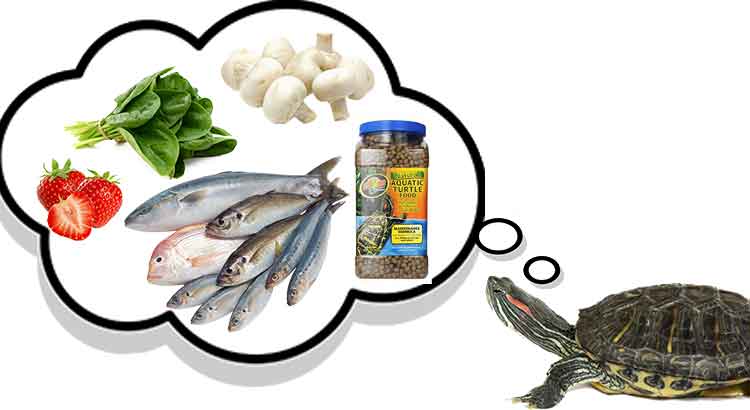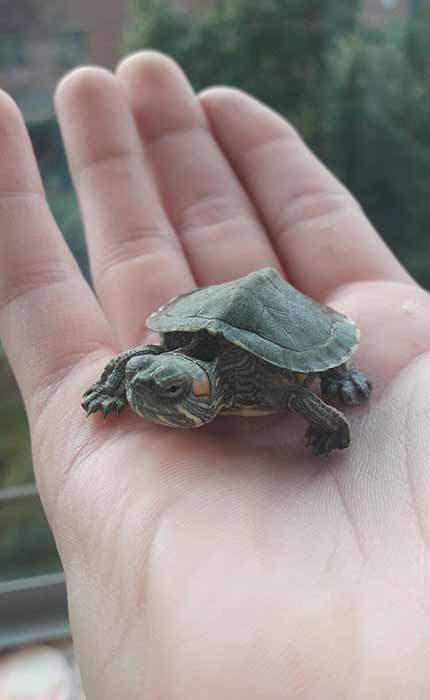Does your turtle always seem to be hungry? And no matter how much food you give it, it still seems to want more. And as soon as you add a little bit of food to its tank it goes straight toward it and eats it. Despite what this might look like, your turtle is not actually hungry, it’s just an opportunistic feeder.
Turtles are opportunistic feeders by nature, this means that they will always eat when the opportunity presents itself, even if they are not hungry. You need to respect a strict feeding schedule. Even if your turtle seems hungry, it actually isn’t.
Even as pets turtles retain their wild behavior when it comes to food. In the wild turtles don’t know when their next meal will be so they can’t afford to pass up on any opportunity to eat.
In this article, we are going to take a quick look at why turtles always seem hungry, what you have to do, and how to properly feed your turtle. Even if in most cases this is just normal behavior, you don’t actually want your turtle to be hungry.
What You Have to Do if Your Turtle Is Always Hungry
If your turtle always seems hungry, the best thing that you can do is ignore it.
As strange as it might sound, the best thing for you and for your turtle is to ignore this type of behavior. Even if your turtle seems hungry, it actually isn’t. Is just in their nature to take advantage of every possible chance of getting food, even if they are not hungry.
As long as you know that you are properly feeding your turtle the right type of food, you are giving it the right amount of food, and that you have a proper feeding schedule then there is no reason to believe that your turtle is actually hungry. If you are not entirely sure of those things then keep reading this article, as I will go over them as well.
If you are doing everything right, and you get fooled by your turtle into giving it more food there is a good chance that you will end up overfeeding your turtle, which can result in serious health problems.
What Will Happen if You Overfeed Your Turtle
There are two main things that can result from overfeeding.
The first possibility is that your turtle will get fat. And this is a really serious problem for a turtle. Unlike other animals, a very big part of the turtle’s body is covered by the shell, so there is no room to accommodate any fat. And this means that the extra fat will drastically affect the internal organs.
If you want to see how this looks, and what to do if it already happened you should check out this article, where I cover this subject in more detail: Can Turtles Get Fat or Overweight? What to Do in This Situation
The other thing that can happen is that your turtle can end up suffering from pyramiding. Pyramiding is an irreversible problem specific to turtles, where the upper part of the shell will overdevelop and get bigger and thicker.
This process is irreversible and can have serious health consequences if it gets out of control. But luckily easier forms of pyramiding won’t affect a turtle too much, and it can be stopped, but not reversed, if you act soon.
Here is a picture of what pyramiding looks like:
So, if all of those bad things can happen if a turtle eats too much, why do they insist on getting more food?
Why Do Turtles Act as if They Are Hungry All the Time?
In the wild, most turtles don’t have access to a proper meal too often. And most of the time they will have to jump on every opportunity that presents itself, those opportunities can take a lot of shapes, a cricket that didn’t notice the turtle and got too close to it, a wild berry bush, a slow fish, etc.
As you can imagine turtles are far from being the most efficient predator, or the fastest animal out there (but they are not actually as slow as you might expect How Fast Are Turtles? (a Turtle That Can Reach 150 MPH)), so when an opportunity arises they can’t afford do lose it.
Turtles also spend a lot of time searching for food. In fact, this is what they do most of their time.
This type of behavior is crucial for a turtle, and without it, they wouldn’t have been able to survive. And even as pets, they will retain it.
Pet turtles, even if you just feed, don’t have a way of knowing that you will do this again, even if you’ve been doing it for the past 5 years. And they will always be looking out for more food.
Speaking of feeding your turtle, we should also take a look at how much, how often, and what you should be feeding your turtle.
How Much You Should Feed Your Turtle
The simplest way to find the right amount of food for your turtle is to follow the size of the head method.
The easiest way to put this method into practice is to find a small container, like a medicine cup, a shot glass, or a bottle cap. This container has to be approximately the same size as the head of your turtle, without the neck. Then you fill that container to the top, and then you can feed the food inside the container to your turtle.
You don’t always have to use a container, you can always just estimate the food that you would need to fill its head. If you sometimes give your turtle a little too much food, and sometimes you give it a little too much, things will be just fine. Your turtle won’t be affected by small differences.
This method works great because it takes into consideration the size of the turtle, and gives you a fixed amount of food that you have to give your turtle. And if your turtle is still growing, the amount of food will be adjusted to fit your turtle.
How Often You Should Feed Your Turtle
This part is really simple, but it will vary depending on the age of your turtle. If your turtle, adult turtles have a different schedule than juveniles, and juveniles have a different schedule than baby turtles.
The life stage of a turtle is not always determined by the age itself, but rather by the size. Overall, a turtle is considered a baby when it’s small enough to be held in the palm, in the case of most turtle species, this stage lasts for about 6 months.
Juvenile turtles are turtles that are still growing. And adult turtles are turtles that have reached their maximum size. So if you search on google for the species of your turtle and then type average size you should get an idea if your turtle is an adult or a juvenile. (If your turtle still needs a couple of inches to reach its full size you can consider it an adult.)
Now let’s get back to how often you should feed your turtle.
If your turtle is an adult you should feed it once every 3 days. And this will look like this.
If your turtle is a juvenile you should feed it once every 2 days. Here is how that will look.
If your turtle is still a baby you should feed it every day. This is how a feeding schedule will look.
What Type of Food You Should Feed Your Turtle
The last thing that we have to take a look at is what type of food you should give your turtle.
Turtles are omnivorous, this means tha they will eat fruits, vegetables, and meat. The only things that they can’t eat are processed foods like pasta, bread, salami, sausages, etc. The only type of processed food that they can eat, are pellets, which should actually make up a good part of what they eat.
A balanced diet will be like this:
- 80% pellets
- 10% fruits and vegetables
- 10% meat / dried insects
As you can see pellets will make up most of their diet, while fruits vegetables, and meat will be like snacks, or treats.
If you own a juvenile or a baby turtle you should know that they will need special turtle pleats which contain more protein than regular ones. If you can’t find pellets for juveniles or babies you can always give them a little more meat or dried insects.
As you can imagine, there are a lot of different types of turtle food types and brands, and some of them are better than others. If you want to know which of them are the best and which you should avoid you should check out this article: Best Turtle Food (We Tested 20 Different Brands)
Final Thoughts
So, while turtles might seem to always be hungry, they actually aren’t. They just act that way because it’s one of their survival mechanisms, that keeps them from starving in the wild where food isn’t always as plentiful.
While I know that it can be hard, you have to overlook the fact that your turtle acts this way. There is no reason to worry as long as you give your turtle enough food. If you end up giving your turtle more food than you should, this can lead to serious health problems.
I hope this article answered all of your questions. But in case there is still something that you want to know, you can always leave a comment in the comment section below, and I will answer it as soon as possible.


